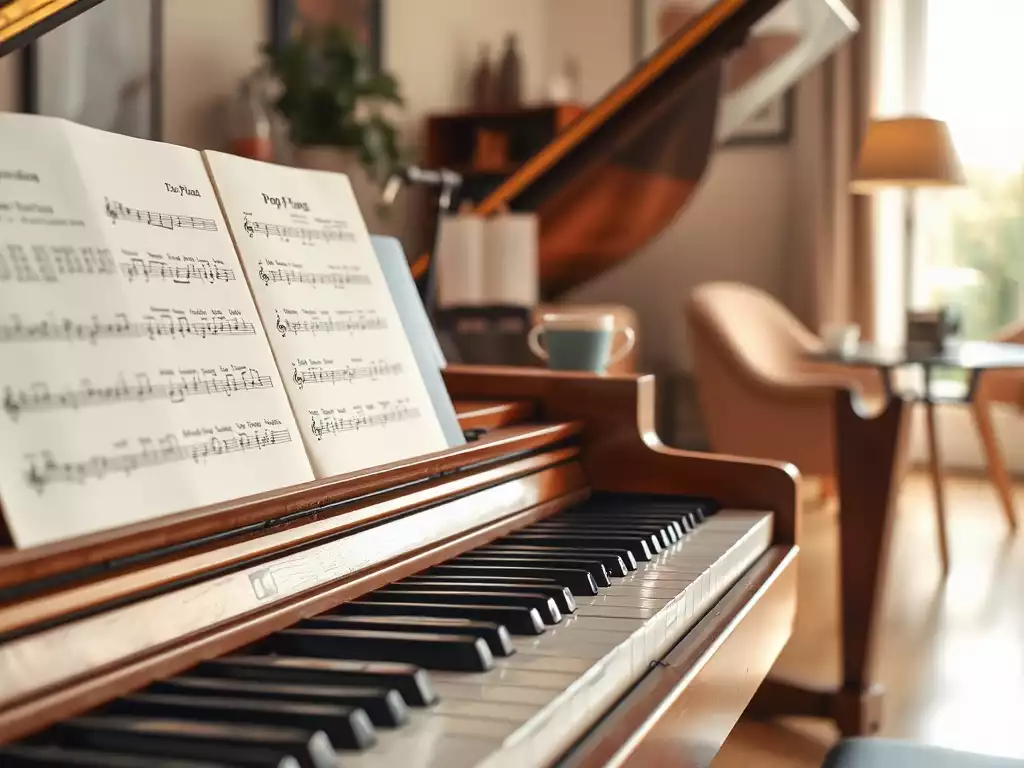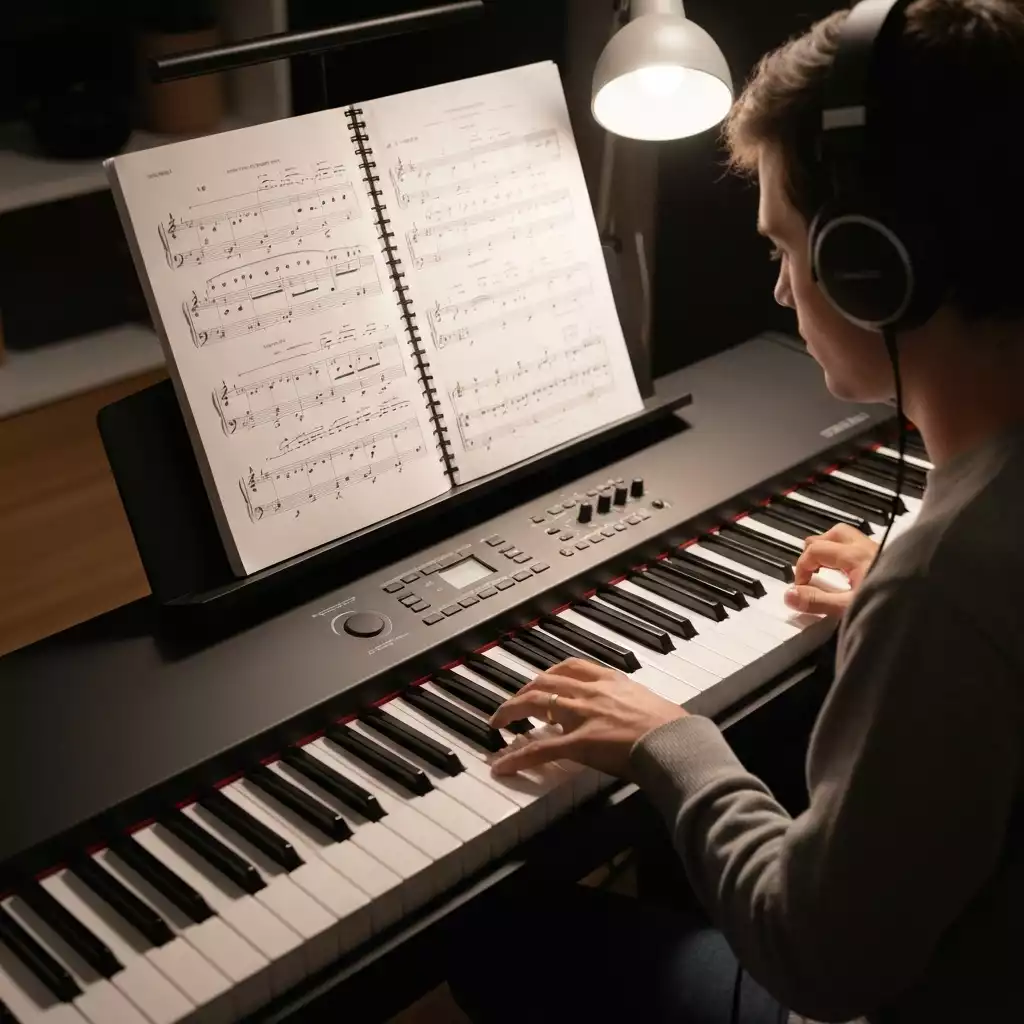What You Will Learn
- The essence of pop piano music includes accessible melodies and simple chord progressions, making it enjoyable for all skill levels.
- Pop piano has evolved through decades, reflecting cultural trends and influences from various music styles, enhancing its appeal.
- Consistent practice is crucial for developing skills, boosting confidence, and tracking progress in your piano journey.
- Adopting a learning mindset encourages continual growth, openness to challenges, and exploration of different musical styles.
- Utilizing resources such as online courses, YouTube tutorials, and sheet music apps can significantly enhance your learning experience.
Key Elements of Pop Piano Evolution and Practice
The journey through pop piano involves understanding its historical shifts and committing to consistent practice. Below, we highlight the pivotal eras in its evolution and essential practice elements.
Evolution of Pop Piano
- 1950s: Rock and roll flair
- 1980s: Synthesizers & electronics
- 2000s: Singer-songwriter simplicity
Why Consistent Practice Matters
- Skill Development: Muscle memory
- Confidence Boost: Performance readiness
- Progress Tracking: Measurable growth
Understanding Pop Piano: An Overview
Pop piano music has a unique charm that resonates with many. It combines catchy melodies with relatable lyrics, making it a favorite among aspiring musicians and seasoned players alike. Understanding pop piano means diving into the elements that make this genre so engaging and widely popular! For more insights into piano genres, check out our guide on different types of pianos.
In essence, pop piano music is characterized by its accessible melodies and chord progressions. It often utilizes simple yet effective rhythms that make it easy to learn and play. This genre appeals to a broad audience, and its ability to connect with listeners makes it a staple in both casual and professional settings.
What is Pop Piano Music?
At its core, pop piano music encompasses a wide range of songs that are catchy and often emotionally driven. These pieces commonly feature simple structures, allowing for quick learning and enjoyment! You’ll find that many pop songs are built around repetitive hooks and memorable melodies, making them perfect for piano performance.
- Simple chord progressions that repeat
- Catchy melodies that resonate with listeners
- Accessible arrangements for pianists of all skill levels
This genre transcends age and skill, inviting everyone to join in on the fun of playing familiar tunes. Whether you’re playing at home for friends or on stage, pop piano music has a way of bringing people together.
The Evolution of Pop Piano: A Brief History
The history of pop piano music is rich and evolving, reflecting broader trends in popular music. From the classic tunes of the 1950s to today’s chart-topping hits, pop piano has adapted with the times. It’s fascinating to see how influences from jazz, rock, and even electronic music have shaped its development! To further explore the history of piano music, read our article on the history of the piano.
- 1950s: The rise of rock and roll brought a new flair to pop piano.
- 1980s: Synthesizers and electronic elements began to dominate.
- 2000s: A return to simplicity with singer-songwriter movements.
As we look at the evolution of this genre, it’s important to appreciate how pop piano reflects cultural shifts. By understanding its history, we can better appreciate the melodies we love today and the creative possibilities they offer for our own playing!
Interactive Poll: Your Pop Piano Journey
As you navigate through your pop piano learning experience, we want to know: What aspect of learning pop piano do you find most challenging?
Choosing the right songs
Mastering chord progressions
Improving rhythm and timing
Understanding music theory
Staying motivated to practice
Frequently Asked Questions About Pop Piano
- What are the key characteristics of pop piano music?
- Pop piano music is characterized by accessible melodies, simple chord progressions, and catchy rhythms, making it enjoyable and easy to learn for various skill levels.
- How has pop piano music evolved over time?
- Pop piano music has evolved significantly, incorporating influences from rock and roll in the 1950s, synthesizers and electronic elements in the 1980s, and a return to singer-songwriter simplicity in the 2000s, reflecting broader cultural trends.
- Why is consistent practice important for learning pop piano?
- Consistent practice is crucial for developing muscle memory, boosting confidence in playing, and tracking measurable progress in your piano journey.
- What is a “learning mindset” in the context of pop piano?
- A learning mindset in pop piano involves embracing curiosity, being open to challenges, viewing mistakes as learning opportunities, and actively seeking feedback and exploring diverse musical styles.
- What resources are recommended for aspiring pop pianists?
- Recommended resources include online courses (e.g., Udemy, Coursera), YouTube tutorials, sheet music apps (e.g., MuseScore), music theory books (e.g., “The Complete Piano Player,” “How Music Works”), and online forums for community engagement and shared knowledge.
Taking the Next Steps in Your Pop Piano Journey
As you dive deeper into the world of pop piano, one thing becomes clear: consistent practice is key to your success! Whether you’re just starting or have been playing for a while, dedicating time to practice each week will significantly improve your skills. I always recommend setting aside specific times for practice—this creates a routine that can help you progress faster.
It’s also vital to focus on the quality of your practice. Instead of just playing through your pieces, aim to work on the challenging sections, refine your technique, and explore new styles. Remember, the more you engage with your piano, the more you’ll grow as a musician!
Why Consistent Practice Matters for Pop Piano Success
When it comes to mastering pop piano, consistency trumps intensity. Just like training for a marathon, regular practice sessions build your stamina and technique. Here are some reasons why consistent practice is essential:
- Skill Development: Regular practice allows you to develop your muscle memory, making it easier to play complex pieces.
- Confidence Boost: The more you practice, the more confident you’ll feel in your abilities, whether playing for friends or at a performance.
- Progress Tracking: By setting consistent practice goals, you can measure your growth over time, which can be incredibly motivating!
As a piano instructor, I’ve seen firsthand how consistency transforms students’ playing. They go from struggling with basic chords to confidently expressing themselves with pop songs they love!
Embracing a Learning Mindset: Continual Growth in Pop Piano
Learning pop piano is a journey, not a destination. Embracing a growth mindset is crucial for your development as a musician. This means being open to challenges and viewing mistakes as opportunities to learn. I always encourage my students to be curious and explore various musical styles and genres.
- Stay Curious: Explore different artists and styles; you never know what might inspire you!
- Seek Feedback: Don’t hesitate to ask peers or instructors for constructive criticism.
- Attend Workshops: Participating in workshops or masterclasses can expose you to new techniques and ideas.
By approaching your pop piano journey with a learning mindset, you’re setting yourself up for long-term success. Remember, every great pianist started somewhere, and each note you play adds to your unique musical story!
Final Thoughts and Resources to Enhance Your Pop Piano Skills
As you embark on this exciting journey, remember that the right resources can make a significant difference. Here at [Your Business Name], we provide a variety of materials tailored for aspiring pop pianists. Whether you’re looking for tutorials, sheet music, or practice exercises, we’ve got you covered.
Recommended Materials and Resources for Ongoing Learning
To keep your skills sharp and your passion ignited, consider incorporating the following resources into your practice:
- Online Courses: Platforms like Udemy or Coursera offer structured lessons that fit your schedule.
- YouTube Tutorials: Channels dedicated to pop piano can provide insights and free lessons!
- Sheet Music Apps: Apps like MuseScore have vast libraries of popular songs to explore.
These resources not only enhance your learning experience but also keep you motivated on your path to becoming a skilled pop pianist!
Music Theory Books and Resources for Aspiring Pop Pianists
Understanding music theory is a powerful tool for any musician. Here are some recommended books and resources that can bolster your knowledge:
- The Complete Piano Player: A fantastic series that covers basics to advanced techniques.
- How Music Works: This book provides insights into the mechanics of music, perfect for any aspiring pianist!
- Online Forums: Engaging with communities on platforms like Reddit can expose you to a wealth of shared knowledge.
By combining practice with a solid understanding of theory, you’ll be well on your way to crafting your unique style in pop piano!
Call to Action: Start Your Pop Piano Adventure Today!
Are you ready to take your pop piano skills to the next level? I invite you to start your journey today! Whether you’re picking your favorite songs to play or exploring new techniques, the adventure is just beginning. Join our community at [Your Business Name] for more resources, lessons, and support! You might also find our article on choosing the perfect piano for beginners helpful as you start.
Remember, every note you play brings you closer to your musical goals. Let’s make beautiful music together!
Recap of Key Points
Here is a quick recap of the important points discussed in the article:
- Pop piano music is characterized by simple chord progressions and catchy melodies, making it accessible for players of all skill levels.
- Consistent practice is essential for skill development, boosting confidence, and tracking progress in your piano journey.
- Embracing a learning mindset allows for continual growth; exploring different styles and seeking feedback can enhance your musical journey.
- Utilizing resources such as online courses, YouTube tutorials, and music theory books can greatly improve your skills and understanding of pop piano.


